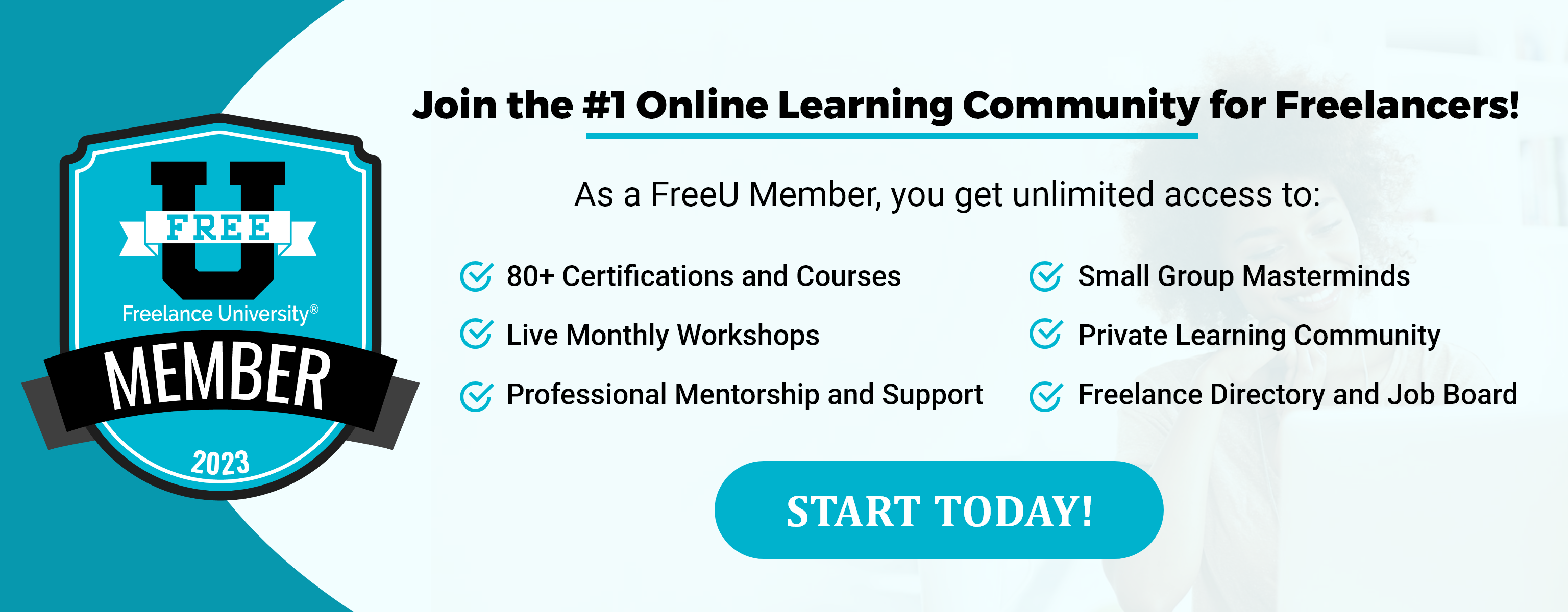Facing Your Fears in Your Freelance Business
By Jena Kroeker

Before we talk about facing your fears in your freelance business, I want to remind you of this important fact:
“You are braver than you believe, stronger than you seem, and smarter than you think.”
― A.A. Milne
In our professional lives, fear can be paralyzing. We want to impress people, and we want to take hold of opportunities, but we’re held back. And we try to hide our fear because we’re ashamed. No one wants to be called a “scaredy cat.”
But as Kim Perell says in her article, “4 Simple Steps to Overcoming Your Fears,” all of us are scared. She advises, “The key isn’t to eliminate your fears, but rather to become the kind of person who faces their fears instead of running away from them.”
Since fear often feels like a wave engulfing us and dragging us down, let’s consider a water-themed illustration.
Life Jacket, Please?
Years ago, I worked as a cabin leader at two summer camps. One was on the west coast of Canada, and the other was inland near a strong flowing river. I knew water sports were going to be the primary activity, and I was afraid because I couldn’t swim. Frankly, you could throw a sack of potatoes in the water, and it would float better than I could.
But I suppressed my fear. I figured it would be okay since we’d be wearing life jackets.
When we arrived on the west coast, my legs turned to jelly. I still remember the feeling of standing on the dock, waiting to begin the first activity on the ocean. I had spent most of my childhood in a landlocked province and had never seen this much water.
I experienced five types of fear all at once:
• What if I get hurt and have to be sent home?
• How do I begin these activities I know nothing about?
• What if I choose an activity I can’t handle?
• Why didn’t I take swimming lessons before I came?
• What if I’m not good enough to help my campers and serve alongside my colleagues?
In a group photo from that trip, you can see me holding onto a life jacket … in the ice cream shop on solid ground. I wasn’t taking any chances.
New and established freelancers and virtual assistants experience fears like these too. Even though you’re safe on land, you can feel like you’re jumping into deep water. Freelancing involves taking a plunge that’s new to many of us.
So, let’s explore five common fears and ways you can counteract them.
(Note: In this article, we’re discussing fears that hold you back from healthy, positive freelancing opportunities. If you’re afraid because a client or opportunity feels unsafe or wrong, seek professional help or advice from a trusted colleague or mentor before proceeding.)
How to Face Your Fears in Your Freelance Business
1. Failure

Photo by Matthew Sleeper on Unsplash
Picture climbing to the top of a high wooden platform and then jumping onto a large inflatable pillow floating on the water. Once you’re there, you need to crawl to the edge and wait until another person jumps off the platform. He or she lands on the opposite end of the pillow and launches you into the air.
This is one of the camp activities I participated in. It’s a fun adrenaline rush, and people enjoy it. But at the top of the platform, all I could think about was failing. What if I failed to land on the pillow and plunged straight into the water?
The funny thing is, I was going to end up in the water anyway when the next person landed on the pillow. So, letting fear stop me just kept everyone waiting and delayed the inevitable. Whether or not I failed, I’d still end up at my destination.
Taking the Leap
Face your fear of failure by accepting that you will fail sometimes in your freelance or virtual assistant business. You will find yourself in the water and need to swim to the shore. But when you do, you’ll become stronger and wiser.
If that failure means losing a client, keep in mind that another ideal client could be just around the corner. And if you launch a business idea that falls flat, don’t give up hope. Use the lessons you learned to try again.
In her article, “How to Face Your Fears and Become the Courageous Entrepreneur You Want To Be,” Karen Beattie shares an encouraging quote from Pat Flynn:
“Failure is a very necessary thing to go through as an entrepreneur. You have to go through failures. If you ask any successful entrepreneur out there if they’ve ever failed, they’ll say, ‘Absolutely!’ And the fact that it was actually required for them to get to where they’re at now. That’s how you know. And here’s a quote that . . . has changed how I feel about fear and why it’s important to think about it in this way, to embrace the fear like you said. And that is, ‘I would much rather live a life full of ‘oh wells’ than a life full of ‘what if’s.’”
2. Uncertainty

Image by tikisada from Pixabay
Another common fear is not knowing where to start. You’re heading into uncharted territory, and you need some sort of plan.
Picture the water sled activity. You’re sitting on it, pulled by a speedboat. You know that the object of the activity is to hang on tight until the speedboat suddenly changes direction. Then you’re thrown off into the water. But you don’t know when this will happen.
That’s the situation I found myself in at camp. I was terrified because I didn’t know when the speedboat would change direction. So I decided to act. I jumped off the water sled myself. Not the customary way of enjoying this activity, but it worked for me. The speedboat circled back and picked me up. I spent the rest of the time helping the driver spot any campers who fell into the water.
Taking Action
If you don’t know where to start, set goals and an action plan to help you move forward. Do some brainstorming to figure out ways to demystify the unknown:
• Create a purpose statement for your business: “Business Name helps Target Audience to Overcome Challenge that Leads to Desired Results.”
• Seek training in your chosen industry and niche.
• Find a mentor.
• Join an online or in-person group with other freelancers or virtual assistants.
• Follow influencers to learn how they started their businesses.
As the article above says,
“Action creates further action; momentum creates further momentum. So, once you take one step, you’ll start building the confidence and the courage to take the next.”
3. The Wrong Choice of Niche

Photo by Arisa Chattasa on Unsplash
Ah, the swimming pool games! Should I participate in the relay race, diving competition, synchronized swimming or … stand on the edge and cheer everyone on?
You can probably guess which choice I made. And though it was the right choice for the circumstances, I couldn’t help fearing that it was wrong. Who was I to stand outside the pool when everyone else was swimming?
But, lo and behold, another camper and I discovered we could help the synchronized swimmers by cueing their arm movements. They watched us so they’d know what to do in the pool. We created a new niche, a new valuable task to perform.
Finding the Right Niche
If you’re afraid of choosing the wrong niche, spend time doing some research. In FreeU’s Freelance 101 course, co-founder and instructor Craig Cannings recommends going through these seven steps to figure out a profitable niche that you’ll enjoy:
1. Assess your interests.
2. Market your niche.
3. Master your niche.
4. Determine your core and complementary niches.
5. Identify your top skills.
6. Research potential niches.
7. Test the niche.
And to test profitable niches, ask these four questions:
1. What do your clients say?
2. What do your colleagues say?
3. What do the stats say (in articles and statistics portals like Statista)?
4. What does Google say? (What words are being searched for related to your service area or niche?)
And to face your fears calmly, remember that you can always change your mind. In a previous blog post, “Finding Your Niche: What to Become in 2021,” we discuss how you can still be flexible even if you’ve been offering a particular service for a long time. Craig Cannings says, “You can always change, adapt or broaden your niche service as time goes on.”
4. Incompetence

Image by Ron Fuller from Pixabay
Remember that camp I talked about near a strong flowing river? One morning I woke up and realized I was scheduled to do some whitewater rafting. As the time drew near, my fear increased. I had never done this type of activity before. I still couldn’t swim. And after the water sled activity, I assumed the object of whitewater rafting was the same — fall into the water when the raft made a sharp turn.
To face my fears, I sought out a head leader. She compassionately listened and gave me wise advice. Then she accompanied us to provide moral support. And finally, to my surprise and joy, I discovered each raft was led by an expert. This person instructed us when to paddle and when to crouch down so we could brave the rapids and stay safe. The object was to remain in the raft, not fall out.
Building Credibility
When you’re afraid of not knowing enough and not being the expert, embrace the opportunity to learn. Don’t be afraid to admit you need to update or add new skills to increase your credibility. Your current and potential clients will be impressed to know that you’re accessing training. It means you’re not content with mediocrity.
And if you have credentials, don’t be afraid to display them on your website and social media. Our Freelance University students often celebrate their certifications as they earn them. They post their achievements in our FreeU Facebook Group and explain how their new skills will enhance their services.
And just like that head leader compassionately came alongside me, find a mentor or mastermind group who can come alongside you. Follow in the footsteps of those who are further along the path. Face your fears by embracing lifelong learning.
5. Displeasing Clients

Photo by Leonardo Alves Sá on Unsplash
You might be wondering if my lack of swimming displeased anyone at camp. Yes, it did. Some were puzzled why I wasn’t as excited as they were about the water sports. I risked disappointing my colleagues and campers.
But others benefited from my choices. Staying on shore meant I was available to help in emergency situations. And campers who were unable to go in the water spent time with me while the others were on the ocean. But that fear stayed in the back of my mind. What if I wasn’t good enough to be a cabin leader again? What if my supervisor and colleagues were displeased with my work?
Setting Expectations
To face your fears of displeasing clients, it’s important to know what they expect. That way, you have goals to aim for.
In an article titled “4 Common Fears New Freelancers Have and How to Overcome Them,” Choncé Maddox offers some great advice:
“First, set expectations early on. Make sure you send the client your best work samples and clarify what they are looking for.
“Then, you’ll want to follow up after the first few weeks to see if they have any feedback for you. If they have any constructive criticism, make sure you don’t take it the wrong way and apply their advice in a positive way.”
This keeps the lines of communication open so both you and your client are happy. But accept the fact that some client relationships won’t work out, or people will be unreasonable.
In his article, “How I Overcame My Biggest Freelancer Fears,” Michael Grothaus puts it this way:
“Without a doubt, the biggest fear of freelancers I’ve spoken with is the fear of rejection. No one likes to be told that they aren’t the right fit for something, and this is all the more true when their livelihood depends on it. But the way to overcome this fear is knowing and accepting that it will happen from time to time, no matter how good you are.”
Final Thoughts and Encouragement
You’ve now arrived at the shore of this water-themed journey into facing your fears in your freelance business. How does it feel?
We hope this article has given you a virtual life jacket you can put on to stay afloat when the waves of fear approach. They don’t have to sweep you away and drag you underwater. Consider Ellen Eastwood’s advice in her article, “How to conquer your fear of going freelance.” She says, “… I’ve learned something empowering and important: the more fear you take on, the less control fear has over you.”
So, let’s face those fears together! Share your thoughts and experiences in the comments below. We’d love to hear how you counteract fears in your freelance or virtual assistant business. Are there any other fears or strategies you’d add to the list?









































































































